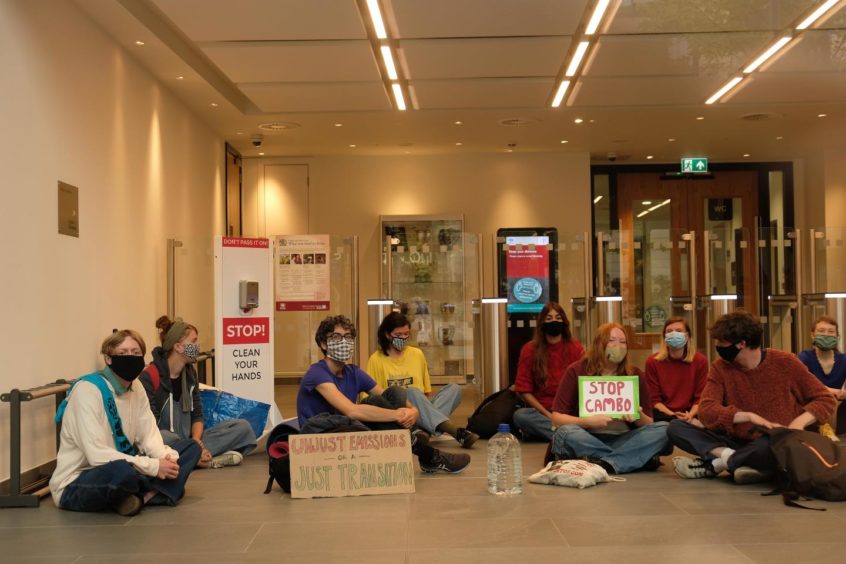
A dozen activists have staged a protest at a UK Government building in Edinburgh in hope of convincing ministers to reject proposals for the Cambo oilfield, west of Shetland.
The activists entered Queen Elizabeth House at 7:30am this morning and are blocking the main entrance by sitting and lying down.
They want the Prime Minister to stop oil companies from developing the 800-million-barrel Cambo field.
A rally will be held at the same government offices at 4pm.
Private-equity backed Siccar Point Energy operates the project and holds a 70% stake, while energy giant Shell holds 30%.
The partners recently re-submitted the environmental statement for the development to the UK Government.
Phase one would target 170m barrels.
Scott Tully, a 29-year-old activist from Glasgow Calls Out Polluters, said “To approve the Cambo oil field would be an act of wilful climate criminality from the UK Government.
“This would also be utterly irreconcilable with the demands of hosting COP26.”
Neil Rothnie, 68, former oil worker and founding member of Offshore Industry Liaison Committee, said: “I don’t believe that we can just keep on exploring for, and producing, all the planet’s oil and gas.
“My understanding of the science is that if we do that, climate change will destroy the planet as we know it, and much of the life it supports.
“I have young grandchildren. That destruction could be well advanced in their grandchildren’s lifetime. That scares the sh*t out of me.”
A UK Government spokeswoman said: “Following an incident this morning at Queen Elizabeth House in Edinburgh we are working with the police to ensure everyone’s safety.
“Currently the vast majority of UK Government civil servants continue to work from home, as they have done throughout the pandemic. This means our services are unaffected by today’s activity.”
The International Energy Agency produced a report in May saying no new oil and gas fields should be developed – beyond those already sanctioned — if the global energy sector is to achieve net-zero emissions by mid-century.
In response to the Stop Cambo campaign, Jonathan Roger, chief executive of Siccar Point, said: “We respect people’s right to engage in dialogue, and to express their feelings and opinions in a safe and peaceful way.
“We have undertaken extensive consultation on the development, as rightly expected by Government, regulatory and public stakeholders.
“We are committed to developing Cambo in a responsible manner which helps the UK meet its net-zero targets.
“The majority of the UK’s energy needs are currently met by oil and gas and the Climate Change Committee and International Energy Agency have said that the UK will still need oil and gas for decades to come as part of the energy transition.
He added: “Cambo has been in planning for many years and is included in the country’s long term energy projections.
“It will secure UK supply rather than rely on imports from less regulated countries, whilst creating more than 1,000 direct UK jobs and thousands more in the supply chain.
“The development has been designed to reduce emissions from the outset and will be built ‘electrification’ ready with the potential to import renewable power when it becomes feasible in the future.”
Industry body Oil and Gas UK has said low-carbon thinking had been applied to projects like Cambo to support the energy transition.
Katy Heidenreich, OGUK’s supply chain and operations director, said: “Through the North Sea Transition Deal, recently agreed with government, the offshore sector is using its 50 years of energy expertise to ensure the UK hits its target of net zero carbon emissions by 2050.”
Welcoming the deal in March, the Oil and Gas Authority’s chief executive, Andy Samuel, pointed out that “oil and gas currently provide around three quarters of the UK’s energy consumption, with government forecasting them to remain important to the energy mix for the foreseeable future”.
In a report to parliament last month, the Climate Change Committee acknowledged that current projections for North Sea oil and gas production suggest it is unlikely to be sufficient to meet future UK needs.
Recommended for you

